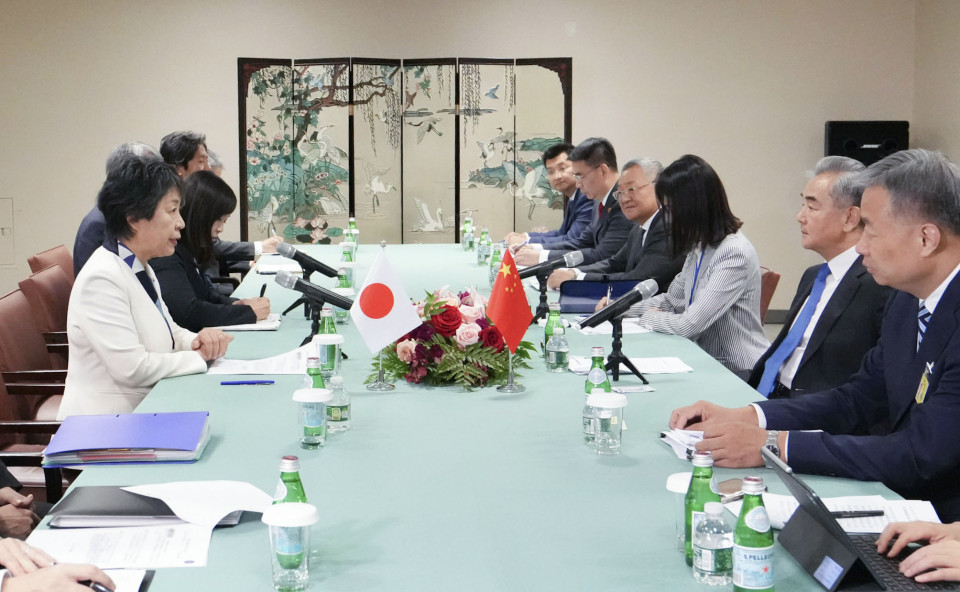Japanese Foreign Minister Yoko Kamikawa on Monday urged Beijing in talks with top Chinese diplomat Wang Yi to take steps to ensure the safety of Japanese citizens, especially children, in the country.
The meeting in New York took place following last week’s fatal stabbing of a Japanese schoolboy in the Chinese city of Shenzhen. Kamikawa also demanded Beijing provide in-depth information about the incident to Tokyo and crack down on anti-Japanese social network and other online postings immediately, Japan’s Foreign Ministry said.
She added that China should make more efforts to remove obstacles hindering better exchanges between the two countries, the ministry said.
Japanese Foreign Minister Yoko Kamikawa (far L) and top Chinese diplomat Wang Yi (2nd from R) meet in New York on Sept. 23, 2024. (Photo courtesy of the Japanese Foreign Ministry)(Kyodo)
It quoted Wang as saying in his response that what happened was an “incidental, individual case that we also did not want to see” and that Chinese authorities will handle it in line with the law.
Wang told Kamikawa that Beijing will safeguard the safety of all foreign citizens in China in accordance with the law and urged Tokyo to view the incident “calmly and rationally and avoid politicizing or escalating” the issue, according to the Chinese Foreign Ministry.
Referring to abusive social media posts, Chinese Foreign Ministry spokesman Lin Jian said at a press conference Monday, “China does not teach its people to hate Japan.”
Many Chinese people laid flowers outside the Shenzhen school to mourn the boy, expressing opposition to violence and calling for everlasting friendship between the Chinese and Japanese people, Lin added.
The 10-year-old boy, whose father is Japanese and mother Chinese, died Thursday after he was stabbed on his way to a Japanese school in the southern Chinese city the day before, with a male suspect detained by police at the scene.
Kamikawa, meanwhile, conveyed Japan’s “serious concern” about China’s recent military activities, such as the first-ever intrusion by a Chinese military plane into Japanese airspace in August, according to the Japanese ministry.
Meeting for nearly one hour on the sidelines of the U.N. General Assembly’s annual high-level sessions, she said Japan wants to hear from China in detail about the intrusion as soon as possible.
The topics covered by Kamikawa and Wang, who last met in Laos in July, included the two governments’ agreement Friday to gradually lift China’s ban on marine products shipped from Japan.
The ban has been imposed since treated radioactive water from Japan’s crippled Fukushima Daiichi nuclear power plant began to be released into the sea in August last year.
Kamikawa said that based on the agreement, Japan will carry out additional monitoring of the water at an early date and make tangible progress toward the complete lifting of the ban, according to the ministry.
Wang stressed that it is natural for China to oppose the ocean discharge of “nuclear-contaminated water.”
Since Japan has agreed to accept long-term international monitoring arrangements and independent sampling and monitoring by stakeholders including China, it “should do what it says and not make unnecessary trouble,” he was quoted as saying by the Chinese Foreign Ministry.
Kamikawa, who arrived in New York on Monday morning, will leave for Japan early Tuesday, as the lawmaker is running in the ruling Liberal Democratic Party’s leadership election on Friday to pick the successor to outgoing Japanese Prime Minister Fumio Kishida.
Related coverage:
Japan, China top diplomats to meet over boy’s killing
Japan top diplomat eyes talks with China counterpart over boy killing
China police believe stabbing of Japanese boy isolated incident


